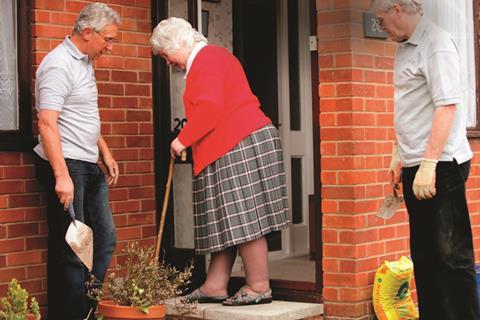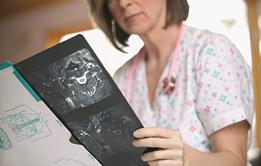Shrewd service redesign by specialist nurses can lead to greater efficiency for providers and better care for patients

When the Five Year Forward View encouraged moving care out of hospital, Sharon Gethins had reason to celebrate being ahead of the game. An inflammatory bowel disease specialist nurse at University Hospitals of Leicester Trust, Ms Gethins has been seeing patients in community settings for over a decade.
The setup began when she and her colleagues realised the existing system just wasn’t efficient for patients or the trust. Consultant clinics were swamped, and many patients forced to travel long distances for appointments.
“We decided bringing services closer to people’s homes would be far better,” remembers Ms Gethins. “We were doing it through telephone clinics, but there was still a group of patients who needed a face to face consultation.”
Going the community way
So each month since 2005, Ms Gethins has run IBD clinics at two local community hospitals. As an independent nurse prescriber, she is even able to introduce new drugs for patients and offer appropriate counselling.
“We don’t need the doctor any more for that, and it’s all being done near the patient’s home instead of in the teaching hospital.”
It’s just one example of how IBD specialist nurses can identify service redesign opportunities – and get on with delivering change.
Just by doing this clinic, I’ve brought in five patients rather than them going through accident and emergency, so that was a £9,000 saving
Another comes in the form of a rapid access clinic at Stockport Foundation Trust. In the face of patients waiting an average of 38 weeks for a diagnosis of inflammatory bowel disease, lead IBD specialist nurse Rachel Campbell was determined to create a better system.

“There is nothing worse than having a patient stuck in primary care waiting for a referral in [to a consultant], then waiting again to be seen by that consultant, and then waiting again to be seen for an investigation,” argues Ms Campbell.
“And in that time they’re probably going back to the GP multiple times for flare up symptoms, and possibly into the emergency department, which costs money. So this idea came about so that we could improve the flow, diagnose patients quicker, and save some money in the process.”
GPs seeing patients with bowel problems now have access to an algorithm which helps them ensure use of the best pathway. If test results suggest possible IBD, the GP is able to refer straight to Ms Campbell, who triages patients and brings them into the rapid access clinic.
“I go through everything with the patient, much as the consultant would do,” she explains. “And as I’ve got advanced nursing experience, I can order any procedure that needs ordering.”
Since setting up the clinic – which took Ms Campbell only three weeks from idea to implementation – the average waiting time from referral to treatment has dropped to nine weeks.
There have been cost savings too. “Just by doing this clinic, I’ve brought in five patients rather than them going through accident and emergency, so that was a £9,000 saving. And the difference between me doing a clinic and a consultant doing a clinic for the first 100 days of the project was about £4,000. It’s putting my skills to best use as well,” says Ms Campbell.
New IBD pathways have also led to cost savings in south London. Lambeth CCG was keen to ensure appropriate use of high cost drugs in IBD, as well as excellent patient care. As a first step, a patient group was set up to discuss experiences.
“The IBD nurses were absolutely brilliant in helping us to do that,” remembers Vanessa Burgess, chief pharmacist and assistant director of commissioning.
Four new pathways were designed, with a view to diagnosing disease early and managing any exacerbations promptly. Says Ms Burgess: “The big thing for us was around not escalating treatment, so catching a disease early and getting a patient on the right treatment. You then also get less surgery, which is hugely expensive.”
According to Bu Hayee, clinical lead for gastroenterology at King’s College Hospital FT, “in every pathway there is a central role for the IBD nurse”.
The team had projected the new setup would save £250,000. “But we’ve actually managed to save nigh on £800,000 in terms of operational costs, drug costs, avoided admissions, and reduced length of stay,” he says.
“Even with that £250,000 projected saving, that’s paid for our IBD nurse many times over. There is this false economy that because [an IBD nurse] is a salary, people see it as an expense that appears on the bottom line. But when you take everything into account, the savings are many times greater.”
A powerful case for specialist nurses

Specialist nurses are far from just the ‘icing on the cake’ – in inflammatory bowel disease alone they are consistently preventing emergency attendances and ensuring the most appropriate use of services
- 1
- 2
 Currently
reading
Currently
reading
How specialist nurses can bring services closer to home
- 4

































No comments yet